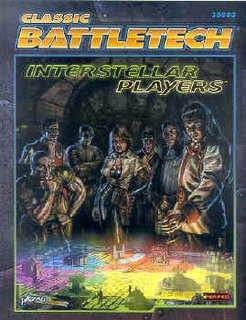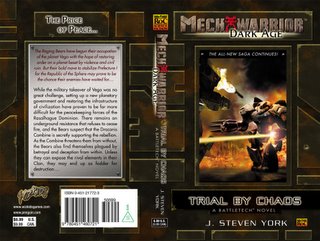
As I said at the end of my previous rant, it was originally only intended to be the set-up for this post. Today's subject is why I believe with great certainty that people project themselves into their reviews and criticisms, and it represents a very narrow sub-set of the kind of behavior I described previously.
You see, there's a criticism that has cropped up several times, from various reviewers, on various unrelated projects, that is so implausible in my case that it's laughable. The criticisms vary in detail, but the gist is that people see in my writing some kind of RPG campaign, or some rote use of RPG game mechanics.
Now, stuff like that does happen in fiction, without doubt. I once read slush for a major fantasy magazine, and every box of mail that arrived had an assortment of stories that were obviously just a chronicle of somebody's D&D campaign. The appearance of the words "thief" or "cleric" in the opening paragraph was usually a clue. Frankly, I suspect there has been no greater poison visited upon fantasy fiction than D&D.
That's not a criticism of the game, because, to be honest, I hardly know enough about it to fairly criticize. I'm just saying that D&D lay down a rather rigid template of character types and adventure formulas and then convinced whole generations that this translated directly into good fantasy fiction, which it does not. A game is a game. A story is a story. There may be an area of overlap, but they are not the same thing.
Here's where I make a confession that will shock, confound, and maybe even outrage a lot of people. I don't game. Not at all. In my entire life, I have never played a role-playing-game. Not D&D. Not BattleTech. Not anything. Nada. None. Zip. I've played strategy games, and I've played MechWarrior a couple times, just long enough to get some feel for how the combat works, and I play a few computer games now and then (sims, shooters, and the occasional strategy game).
This despite the fact that I'm just about to start work on my third MechWarrior Dark Age novel, set in what is essentially an RPG universe (though MechWarrior itself is a miniature-based strategy game set in that universe). This despite the fact that I wrote the greatest Heavy Gear novel never-published. Sure, I've read from lots and lots of rule-books and game supplements. But I've made a conscious decision not to play the games so far, and at this late date, I doubt I ever will.
I've already hinted at the biggest reason why. I think that excessive familiarity with the game will inevitably color the storytelling. This might not hurt the story, but I really don't believe it can help it. My theory of fiction is that everything must serve the needs of the story. If other elements start pushing the story around, then that's wrong. If I ever find myself thinking about hit-points or combat tables rather than characters, plot, and the reader's experience, then I've gone horribly off-track. To my mind, the best way not to have that happen, even unconsciously, is simply not to know about any of those things.
As I've said, I do read the game guides. I do study the tech, the worlds, the history, the people. But I carefully avoid (as much as possible) the bits about game mechanics and actual play. Inevitably some of it slips through (you can't write MechWarrior/BattleTech unless you understand heat-dissipation, for instance), but I try to keep it to a minimum, and think of it as explanations of real technology and engineering, not game rules. My theory of how to write one of these books is to treat the world I'm writing about as absolutely real. I read them the same way I might read a Fodor's travel guide or a CIA Fact book entry on a real country I was writing about.
I do not write about games. I write about characters, worlds, and situations. BattleTech's Inner Sphere, Heavy Gear's Terra Nova, Conan's Stygia, or Marvel's Xavier School for Gifted Youngsters, these are not parts of a game, references from some old pulp-adventures, or names in some comic-book. They are real places that exist in my head, based on extensive research and extrapolation from that research. I've never been there, but they feel real to me.
Sure, I know it's all make-believe, but unless on some level I can totally buy into that world, I don't see how I can expect the reader to buy it either. And I'll never buy into it that deeply if I constantly see all the springs, wires and hidden mechanisms that make it work.
Now, I admit that most writers of game fiction don't do things that way. My friend Loren Coleman, who has also written MechWarrior and Conan (not to mention classic BattleTech and other game fiction) is an avid gamer and game designer. Michael A. Stackpole, who is pretty much God to fans of BattleTech fiction, reportedly games every battle in one of his books, and if the outcome isn't what he was planning, he changes the book accordingly.
Assuming this is correct, and it works for him, then that's great. But I can't in my wildest dreams imagine writing a book that way. I often play fast-and-loose with the game universes I work in, and consciously put myself out on the edge of what will work. Sometimes I go over the edge, either accidentally, or more often because I think it's somehow justified. At that point, I depend on the editors and the game people who vet the outlines and manuscript to tell me to pull it back in.
Usually I do. Sometimes we argue about it, and then usually I end up fixing it anyway. But sometimes I win, and things get in there that just don't work in the game. But they work for the story, and that's worth fighting for.
Yes, occasionally this does put me at odds with my editors and the game folks. Fact is, they usually are very familiar with the game mechanics and play (in fact, I count on it), and their emotional investment is with the game, not the books. That's just common sense. The games are always the biggest part of their bread-and-butter. The novels are just a little side-license that generates some extra income. Nothing to sneeze at, but a sidebar. So it's only reasonable for an editor or reader in that position to believe that the novels should be written about the game.
But that's not the way I write novels. I write novels about the real world(s) that the game is based on, and any game is always just going to be a simplified approximation of that world. That's a subtle but important difference in approach.
Usually those two very-different views overlap enough not to cause problems, but as I've said, there are sometimes conflicts. When that happens, I make my cause, but ultimately, in this sort of thing, the final call always goes to the company licensing the fiction. That's as it should be. I feel like I'm there to advocate my viewpoint, not enforce it. (If I felt I had to enforce it, I wouldn't be working very much. The licensee is boss!)
So why don't I just write books their way and save myself the trouble? Because I think that this is the best way to produce good books. I do the best I can from my approach, and they edit it critically from their different one, I advocate in return from my viewpoint, and we come to some compromise (probably weighted in their favor). But and I think the result is usually better than either approach alone would generate.
I try things, take approaches, not strictly drawn from the way the game works, and in turn push the envelope of the kinds of stories we can tell. They then keep it real for the gamers who are a primary consumer of these kinds of books. If I go too far, if I'm going to alienate that audience, then they're there to call me on it and to correct it. But to my mind, it's always better to go to far and trim back, than to conservatively color well inside the lines. And if you know where the lines are you're always, consciously or not, going to start putting on the brakes before you get there.
So, if you think you see game mechanics or cliches peeking at you from between the pages of one of my books, then it's almost certainly your imagination. I'm certainly not faulting you for thinking it, but I'd suggest you not say it out loud, or post it on Amazon for that matter.
The human brain is wired to see what it wants to see in randomness. We're programmed to find patterns, even if there's nothing there, and we inevitably draw upon ourselves to flesh out those patterns. It's why most people see pictures in every cloud. And it's why some people see die-rolls behind every plot twist.













